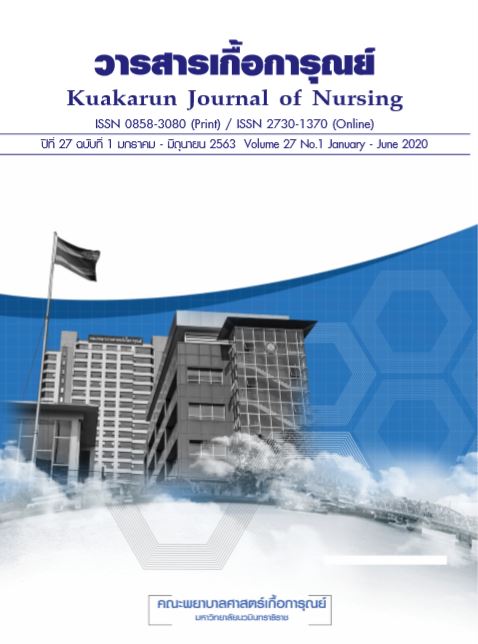ปัจจัยที่มีความสัมพันธ์กับความวิตกกังวลของญาติผู้ดูแลเกี่ยวกับความตายของผู้ป่วยมะเร็งระยะลุกลาม
คำสำคัญ:
ความวิตกกังวลเกี่ยวกับความตาย, ญาติผู้ดูแล, มะเร็งระยะลุกลามบทคัดย่อ
การวิจัยเชิงพรรณนาหาความสัมพันธ์นี้มีวัตถุประสงค์เพื่อความสัมพันธ์ระหว่างสัมพันธภาพ กับผู้ป่วย การรับรู้อาการผู้ป่วย ทัศนคติต่อความตาย การปฏิบัติกิจกรรมตามความเชื่อทางศาสนาที่เกี่ยวกับ ความตาย ความรู้เกี่ยวกับการดูแลผู้ป่วยมะเร็งระยะลุกลาม กับความวิตกกังวลของญาติผู้ดูแลเกี่ยวกับ ความตายของผู้ป่วยมะเร็งระยะลุกลาม โดยใช้กรอบแนวคิดความวิตกกังวลเกี่ยวกับความตายของคอนเต และคณะ กลุ่มตัวอย่าง คือ ญาติผู้ดูแลผู้ป่วยมะเร็งระยะลุกลามจำนวน 199 คน ที่เข้ามารับการรักษา ในแผนกผู้ป่วยนอกของโรงพยาบาลระดับตติยภูมิในเขตกรุงเทพมหานคร 3 แห่ง คัดเลือกกลุ่มตัวอย่าง ด้วยวิธีการสุ่มหลายขั้นตอน เครื่องมือที่ใช้ในการวิจัยเป็นแบบสอบถาม ได้แก่ ข้อมูลส่วนบุคคลของผู้ป่วย ข้อมูลส่วนบุคคลของญาติผู้ดูแลผู้ป่วย การรับรู้อาการผู้ป่วย สัมพันธภาพกับผู้ป่วย ทัศนคติต่อความตาย การปฏิบัติกิจกรรมตามความเชื่อทางศาสนาที่เกี่ยวกับความตาย ความรู้เกี่ยวกับการดูแลผู้ป่วยมะเร็งระยะ ลุกลาม และความวิตกกังวลของญาติผู้ดูแลเกี่ยวกับความตายของผู้ป่วยมะเร็งระยะลุกลาม ซึ่งได้ผ่านการ ตรวจสอบความตรงตามเนื้อหาโดยผู้ทรงคุณวุฒิ 5 ท่าน และมีค่าความเที่ยงของแบบสอบถามเท่ากับ .83, .79, .88, .95 และ .86 ตามลำดับ ทำการเก็บรวบรวมข้อมูลโดยกลุ่มตัวอย่างตอบแบบสอบถามด้วยตนเอง วิเคราะห์ข้อมูลโดยการหาค่าความถี่ ร้อยละ ค่าเฉลี่ย ส่วนเบี่ยงเบนมาตรฐาน และค่าสัมประสิทธิ์สหสัมพันธ์ ของเพียร์สัน
ผลการวิจัยพบว่า (1) ญาติผู้ดูแลร้อยละ 56.90 มีความวิตกกังวลของเกี่ยวกับความตายของผู้ป่วย มะเร็งระยะลุกลามโดยรวมอยู่ในระดับปานกลางค่อนไปทางสูง (x̄ = 3.7, S.D = 0.63) (2) การรับรู้อาการ ผู้ป่วยมีความสัมพันธ์ทางบวกความวิตกกังวลของญาติผู้ดูแลเกี่ยวกับความตายของผู้ป่วยมะเร็งระยะลุกลาม โดยรวมอย่างมีนัยสำคัญทางสถิติที่ระดับ .05 (3) การปฏิบัติกิจกรรมตามความเชื่อทางศาสนาที่เกี่ยวกับ ความตาย ทัศนคติต่อความตาย และความรู้เกี่ยวกับการดูแลผู้ป่วยมะเร็งระยะลุกลาม มีความสัมพันธ์ทาง ลบกับความวิตกกังวลของญาติผู้ดูแลเกี่ยวกับความตายของผู้ป่วยมะเร็งระยะลุกลามโดยรวมอย่างมีนัยสำคัญ ทางสถิติที่ระดับ .05
เอกสารอ้างอิง
National Cancer Institute, Department of Medical Services, Ministry of Public Health, Thailand. Hospital-based cancer register 2018 [Internet]. 2019 [cited 2019 Dec 2]. Available from: http://www.nci.go.th/th/File_download/Nci%20Cancer%20Registry/Hospital%20Based_2018.pdf (in Thai)
Klein DF. Psychopharmacologic treatment of panic disorder. Psychosomatics 1984;25(10 Suppl):32-6.
Sherman DW, Norman R, McSherry CB. A comparison of death anxiety and quality of life of patients with advanced cancer or AIDS and their family caregivers. Journal of the Association of Nurses in AIDS Care 2010;21(2):99-112.
Soleimani MA, Lehto RH, Negarandeh R, Bahrami N, Chan YH. Death anxiety and quality of life in iranian caregivers of patients with cancer. Cancer Nursing 2017;40(1):e1-e10.
Duandaw R. Health needs of family caregivers of terminal cancer patients: a phenomenological study. Bangkok: Chulalongkorn University; 2004. (in Thai)
Srikasipan P. The nursing roles of the dying patient and family caregiver. 12th ed. Bangkok: Chulalongkorn University Press; 2009. (in Thai)
Meecharoen W. Family caregivers of cancer patients: roles’ adaptation and quality of life promotion. Ramathibodi Nursing Journal 2014;20(1):10-22. (in Thai)
Tongprateep T. Nurse: being with the dying. 2nd ed. Bangkok: V print 1991; 2010. (in Thai)
Department of Medical Services, Ministry of Public Health, Thailand. Thai palliative care guideline 2014 [Internet]. 2014 [cited 2019 Dec 2]. Available from: https://www.skko.moph.go.th/dward/document_file/perdev/common_form_upload_file/20150316154846_2129601774.pdf (in Thai)
Kaewraya K. Relationships between personal factors, ability of elderly to perform daily living activities, elderly and elderly caregiver relationships and role stress of caregiver of the elderly in Petchaburi Municipality, Petchaburi Province [Dissertation]. Bangkok: Chulalongkorn University; 1997. (in Thai)
Promnoi C. Factor predicting caregivers’ participation in caring for hospitalized elderly: a case study of the university hospital in Southern Thailand. Songkla: Prince of Songkla University; 2004. (in Thai)
Dhammaramo S. The attitude towards death in Theravada Buddhism: a case study of students from the classroom of Wat Chaichumbhonchanasongkhram Mahachulalongkornajavidyalaya University, Kanchanaburi Province. Kanchanaburi: Mahachulalongkornrajavidyalaya University; 2011. (in Thai)
Conte HR, Weiner MB, Plutchik R. Measuring death anxiety: conceptual, psychometric, and factor-analytic aspects. Journal of Personality and Social Psychology 1982;43(4):775-85.
Jonsen E, Athlin E, Suhr OB. Family members’ experience of familial amyloidotic polyneuropathy disease--an infernal struggle and a fact of life. Journal of Advanced Nursing 2000;31(2):347-53.
Carr D. A “good death” for whom? quality of spouse’s death and psychological distress among older widowed persons. Journal of Health and Social Behavior 2003;44(2):215-32.
Sigelman CK, Shaffer DR. Life-span human development. Pacific Grove (CA): Brooks/Cole Publishing Company; 1995.
Lonetto R,Templer DI. Death anxiety. Washington, DC: Hemisphere Publishing Corporation; 1986.
Mayurasuwan K. The effect of educative - supportive care combined with progressive muscle relaxation program on anxiety among family caregivers of parents with advanced cancer [Dissertation]. Bangkok: Chulalongkorn University; 2009. (in Thai)
Rattanapreechakul B. The development of management of anxiety reduction pattern for family caregivers of stroke patients at the tertiary level hospital in Suphanburi Province. Nakhon Pathom: Christian University of Thailand; 2012. (in Thai)

















